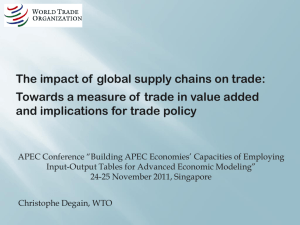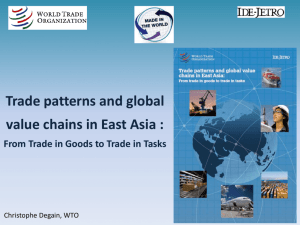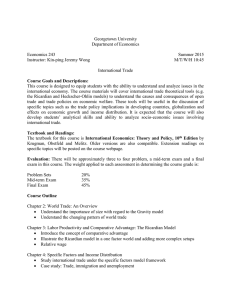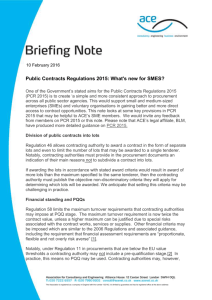W T O
advertisement
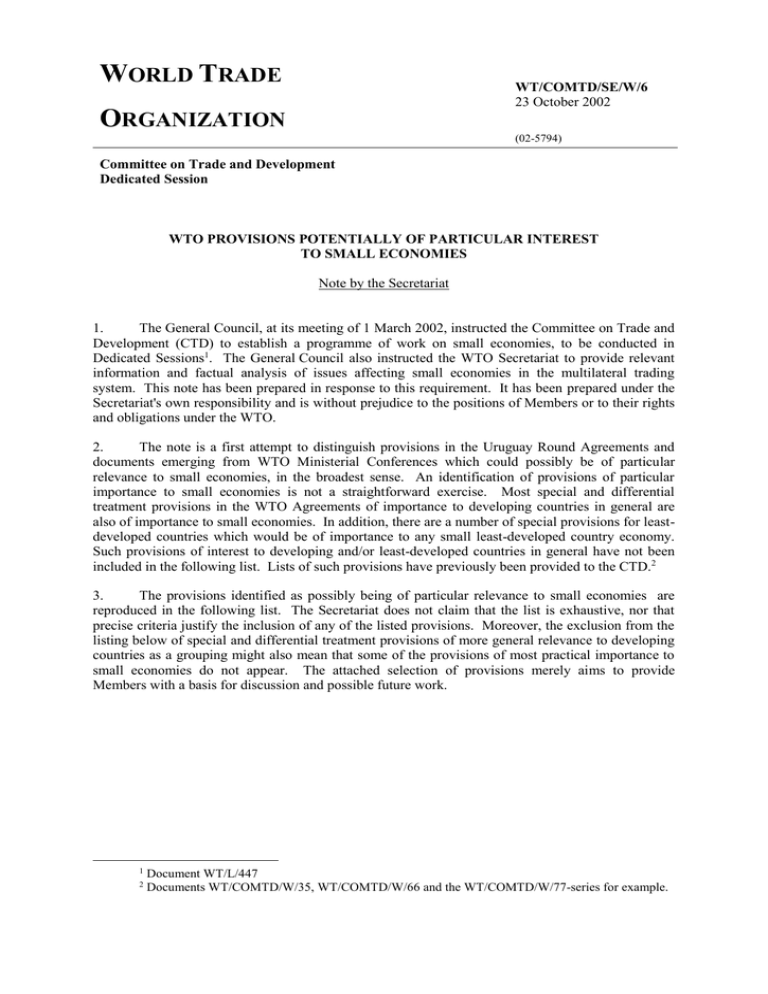
WORLD TRADE WT/COMTD/SE/W/6 23 October 2002 ORGANIZATION (02-5794) Committee on Trade and Development Dedicated Session WTO PROVISIONS POTENTIALLY OF PARTICULAR INTEREST TO SMALL ECONOMIES Note by the Secretariat 1. The General Council, at its meeting of 1 March 2002, instructed the Committee on Trade and Development (CTD) to establish a programme of work on small economies, to be conducted in Dedicated Sessions1. The General Council also instructed the WTO Secretariat to provide relevant information and factual analysis of issues affecting small economies in the multilateral trading system. This note has been prepared in response to this requirement. It has been prepared under the Secretariat's own responsibility and is without prejudice to the positions of Members or to their rights and obligations under the WTO. 2. The note is a first attempt to distinguish provisions in the Uruguay Round Agreements and documents emerging from WTO Ministerial Conferences which could possibly be of particular relevance to small economies, in the broadest sense. An identification of provisions of particular importance to small economies is not a straightforward exercise. Most special and differential treatment provisions in the WTO Agreements of importance to developing countries in general are also of importance to small economies. In addition, there are a number of special provisions for leastdeveloped countries which would be of importance to any small least-developed country economy. Such provisions of interest to developing and/or least-developed countries in general have not been included in the following list. Lists of such provisions have previously been provided to the CTD.2 3. The provisions identified as possibly being of particular relevance to small economies are reproduced in the following list. The Secretariat does not claim that the list is exhaustive, nor that precise criteria justify the inclusion of any of the listed provisions. Moreover, the exclusion from the listing below of special and differential treatment provisions of more general relevance to developing countries as a grouping might also mean that some of the provisions of most practical importance to small economies do not appear. The attached selection of provisions merely aims to provide Members with a basis for discussion and possible future work. 1 2 Document WT/L/447 Documents WT/COMTD/W/35, WT/COMTD/W/66 and the WT/COMTD/W/77-series for example. WT/COMTD/SE/W/6 Page 2 A. GENERAL AGREEMENT ON TARIFFS AND TRADE 1994 2. Understanding on the Interpretation of Article XXVIII of the General Agreement on Tariffs and Trade 1994 Members hereby agree as follows: 1. For the purposes of modification or withdrawal of a concession, the Member which has the highest ratio of exports affected by the concession (i.e. exports of the product to the market of the Member modifying or withdrawing the concession) to its total exports shall be deemed to have a principal supplying interest if it does not already have an initial negotiating right or a principal supplying interest as provided for in paragraph 1 of Article XXVIII. It is however agreed that this paragraph will be reviewed by the Council for Trade in Goods five years from the date of entry into force of the WTO Agreement with a view to deciding whether this criterion has worked satisfactorily in securing a redistribution of negotiating rights in favour of small and medium-seized exporting Members. If this is not the case, consideration will be given to possible improvements, including, in the light of the availability of adequate data, the adoption of a criterion based on the ration of exports affected by the concession to exports to all markets of the product in question. B. GENERAL AGREEMENT ON TARIFFS AND TRADE 1947 Article XXXVI Principles and Objectives 4. Given the continued dependence of many less-developed contracting parties on the exportation of a limited range of primary products,* there is need to provide in the largest possible measure more favourable and acceptable conditions of access to world markets for these products, and wherever appropriate to devise measures designed to stabilize and improve conditions of world markets in these products, including in particular measures designed to attain stable, equitable and remunerative prices, thus permitting an expansion of world trade and demand and a dynamic and steady growth of the real export earnings of these countries so as to provide them with expanding resources for their economic development. C. AGREEMENT ON TEXTILES AND CLOTHING Article 2 18. As regards those Members whose exports are subject to restrictions on the day before the entry into force of the WTO Agreement and whose restrictions represent 1.2 per cent or less of the total volume of the restrictions applied by an importing Member as of 31 December 1991 and notified under this Article, meaningful improvement in access for their exports shall be provided, at the entry into force of the WTO Agreement and for the duration of this Agreement, through advancement by one stage of the growth rates set out in paragraphs 13 and 14, or through at least equivalent changes as may be mutually agreed with respect to a different mix of base levels, growth and flexibility provisions. Such improvements shall be notified to the TMB. WT/COMTD/SE/W/6 Page 3 Article 6 6. In the application of the transitional safeguard, particular account shall be taken of the interests of exporting Members as set out below: D. (b) Members whose total volume of textile and clothing exports is small in comparison with the total volume of exports of other Members and who account for only a small percentage of total imports of that product into the importing Member shall be accorded differential and more favourable treatment in the fixing of the economic terms provided in paragraphs 8, 13 and 14. For those suppliers, due account will be taken, pursuant to paragraphs 2 and 3 of Article 1, of the future possibilities for the development of their trade and the need to allow commercial quantities of imports from them; (c) with respect to wool products from wool-producing developing country Members whose economy and textiles and clothing trade are dependent on the wool sector, whose total textile and clothing exports consist almost exclusively of wool products, and whose volume of textiles and clothing trade is comparatively small in the markets of the importing Members, special consideration shall be given to the export needs of such Members when considering quota levels, growth rates and flexibility; (d) more favourable treatment shall be accorded to re-imports by a Member of textile and clothing products which that Member has exported to another Member for processing and subsequent reimportation, as defined by the laws and practices of the importing Member, and subject to satisfactory control and certification procedures, when these products are imported from a Member for which this type of trade represents a significant proportion of its total exports of textiles and clothing. AGREEMENT ON TECHNICAL BARRIERS TO TRADE Article 2: Preparation, Adoption and Application of Technical Regulations by Central Government Bodies 2.3 Technical regulations shall not be maintained if the circumstances or objectives giving rise to their adoption no longer exist or if the changed circumstances or objectives can be addressed in a less trade-restrictive manner. 2.4 Where technical regulations are required and relevant international standards exist or their completion is imminent, Members shall use them, or the relevant parts of them, as a basis for their technical regulations except when such international standards or relevant parts would be an ineffective or inappropriate means for the fulfilment of the legitimate objectives pursued, for instance because of fundamental climatic or geographical factors or fundamental technological problems. WT/COMTD/SE/W/6 Page 4 E. AGREEMENT ON IMPLEMENTATION OF ARTICLE VI (ANTI-DUMPING) OF THE GENERAL AGREEMENT ON TARIFFS AND TRADE 1994 Article 6 Evidence 6.13 The authorities shall take due account of any difficulties experienced by interested parties, in particular small companies, in supplying information requested, and shall provide any assistance practicable. F. AGREEMENT ON SUBSIDIES AND COUNTERVAILING MEASURES Article 27: Special and Differential Treatment of Developing Country Members 27.2 The prohibition of paragraph 1(a) of Article 3 shall not apply to: (a) developing country Members referred to in Annex VII. (b) other developing country Members for a period of eight years from the date of entry into force of the WTO Agreement, subject to compliance with the provisions in paragraph 4. 27.5 A developing country Member which has reached export competitiveness in any given product shall phase out its export subsidies for such product(s) over a period of two years. However, for a developing country Member which is referred to in Annex VII and which has reached export competitiveness in one or more products, export subsidies on such products shall be gradually phased out over a period of eight years. 27.6 Export competitiveness in a product exists if a developing country Member's exports of that product have reached a share of at least 3.25 per cent in world trade of that product for two consecutive calendar years. Export competitiveness shall exist either (a) on the basis of notification by the developing country Member having reached export competitiveness, or (b) on the basis of a computation undertaken by the Secretariat at the request of any Member. For the purpose of this paragraph, a product is defined as a section heading of the Harmonized System Nomenclature. The Committee shall review the operation of this provision five years from the date of the entry into force of the WTO Agreement. 27.10 Any countervailing duty investigation of a product originating in a developing country Member shall be terminated as soon as the authorities concerned determine that: (a) the overall level of subsidies granted upon the product in question does not exceed 2 per cent of its value calculated on a per unit basis; or (b) the volume of the subsidized imports represents less than 4 per cent of the total imports of the like product in the importing Member, unless imports from developing country Members whose individual shares of total imports represent less than 4 per cent collectively account for more than 9 per cent of the total imports of the like product in the importing Member. WT/COMTD/SE/W/6 Page 5 27.11 For those developing country Members within the scope of paragraph 2(b) which have eliminated export subsidies prior to the expiry of the period of eight years from the date of entry into force of the WTO Agreement, and for those developing country Members referred to in Annex VII, the number in paragraph 10(a) shall be 3 per cent rather than 2 per cent. This provision shall apply from the date that the elimination of export subsidies is notified to the Committee, and for so long as export subsidies are not granted by the notifying developing country Member. This provision shall expire eight years from the date of entry into force of the WTO Agreement. 27.12 The provisions of paragraphs 10 and 11 shall govern any determination of de minimis under paragraph 3 of Article 15. Annex VII: Developing Country Members Referred to in Paragraph 2(A) of Article 27 The developing country Members not subject to the provisions of paragraph 1(a) of Article 3 under the terms of paragraph 2(a) of Article 27 are: G. (a) Least-developed countries designated as such by the United Nations which are Members of the WTO. (b) Each of the following developing countries which are Members of the WTO shall be subject to the provisions which are applicable to other developing country Members according to paragraph 2(b) of Article 27 when GNP per capita has reached $1,000 per annum3 (Bolivia, Cameroon, Congo, Côte d'Ivoire, Dominican Republic, Egypt, Ghana, Guatemala, Guyana, India, Indonesia, Kenya, Morocco, Nicaragua, Nigeria, Pakistan, Philippines, Senegal, Sri Lanka and Zimbabwe). AGREEMENT ON SAFEGUARDS Article 9: Developing Country Members 1. Safeguard measures shall not be applied against a product originating in a developing country Member as long as its share of imports of the product concerned in the importing Member does not exceed 3 per cent, provided that developing country Members with less than 3 per cent import share collectively account for not more than 9 per cent of total imports of the product concerned. H. GENERAL AGREEMENT ON TARIFFS AND TRADE 1947 Article XVIII Governmental Assistance to Economic Development 1. The contracting parties recognize that the attainment of the objectives of this Agreement will be facilitated by the progressive development of their economies, particularly of those contracting parties the economies of which can only support low standards of living* and are in the early stages of development.* 3 The inclusion of developing country Members in the list in paragraph (b) is based on the most recent data from the World Bank on GNP per capita. WT/COMTD/SE/W/6 Page 6 2. The contracting parties recognize further that it may be necessary for those contracting parties, in order to implement programmes and policies of economic development designed to raise the general standard of living of their people, to take protective or other measures affecting imports, and that such measures are justified in so far as they facilitate the attainment of the objectives of this Agreement. They agree, therefore, that those contracting parties should enjoy additional facilities to enable them (a) to maintain sufficient flexibility in their tariff structure to be able to grant the tariff protection required for the establishment of a particular industry* and (b) to apply quantitative restrictions for balance of payments purposes in a manner which takes full account of the continued high level of demand for imports likely to be generated by their programmes of economic development. 3. The contracting parties recognize finally that, with those additional facilities which are provided for in Sections A and B of this Article, the provisions of this Agreement would normally be sufficient to enable contracting parties to meet the requirements of their economic development. They agree, however, that there may be circumstances where no measure consistent with those provisions is practicable to permit a contracting party in the process of economic development to grant the governmental assistance required to promote the establishment of particular industries* with a view to raising the general standard of living of its people. Special procedures are laid down in Sections C and D of this Article to deal with those cases. 4. (a) Consequently, a contracting party, the economy of which can only support low standards of living* and is in the early stages of development,* shall be free to deviate temporarily from the provisions of the other Articles of this Agreement, as provided in Sections A, B and C of this Article. (b) A contracting party, the economy of which is in the process of development, but which does not come within the scope of subparagraph (a) above, may submit applications to the CONTRACTING PARTIES under Section D of this Article. 5. The contracting parties recognize that the export earnings of contracting parties, the economies of which are of the type described in paragraph 4(a) and (b) above and which depend on exports of a small number of primary commodities, may be seriously reduced by a decline in the sale of such commodities. Accordingly, when the exports of primary commodities by such a contracting party are seriously affected by measures taken by another contracting party, it may have resort to the consultation provisions of Article XXII of this Agreement. (a) Ad Article XVIII Paragraphs 1 and 4 1. When they consider whether the economy of a contracting party "can only support low standards of living", the CONTRACTING PARTIES shall take into consideration the normal position of that economy and shall not base their determination on exceptional circumstances such as those which may result from the temporary existence of exceptionally favourable conditions for the staple export product or products of such contracting party. 2. The phrase "in the early stages of development" is not meant to apply only to contracting parties which have just started their economic development, but also to contracting parties the economies of which are undergoing a process of industrialization to correct an excessive dependence on primary production. WT/COMTD/SE/W/6 Page 7 Paragraphs 2, 3, 7, 13 and 22 The reference to the establishment of particular industries shall apply not only to the establishment of a new industry, but also to the establishment of a new branch of production in an existing industry and to the substantial transformation of an existing industry, and to the substantial expansion of an existing industry supplying a relatively small proportion of the domestic demand. It shall also cover the reconstruction of an industry destroyed or substantially damaged as a result of hostilities or natural disasters. Paragraphs 16, 18, 19 and 22 1. It is understood that the CONTRACTING PARTIES may concur in a proposed measure subject to specific conditions or limitations. If the measure as applied does not conform to the terms of the concurrence it will to that extent be deemed a measure in which the CONTRACTING PARTIES have not concurred. In cases in which the CONTRACTING PARTIES have concurred in a measure for a specified period, the contracting party concerned, if it finds that the maintenance of the measure for a further period of time is required to achieve the objective for which the measure was originally taken, may apply to the CONTRACTING PARTIES for an extension of that period in accordance with the provisions and procedures of Section C or D, as the case may be. 2. It is expected that the CONTRACTING PARTIES will, as a rule, refrain from concurring in a measure which is likely to cause serious prejudice to exports of a commodity on which the economy of a contracting party is largely dependent. I. GENEVA MINISTERIAL DECLARATION 6. We remain deeply concerned over the marginalization of least-developed countries and certain small economies, and recognize the urgent need to address this issue which has been compounded by the chronic foreign debt problem facing many of them. In this context we welcome the initiatives taken by the WTO in cooperation with other agencies to implement in an integrated manner the Plan of Action for the least-developed countries which we agreed at Singapore, especially through the High-Level Meeting on Least-Developed Countries held in Geneva in October 1997. We also welcome the report of the Director-General on the follow-up of this initiative, to which we attach great importance. We commit ourselves to continue to improve market access conditions for products exported by the leastdeveloped countries on as broad and liberal a basis as possible. We urge Members to implement the market-access commitments that they have undertaken at the High-Level Meeting. J. DOHA MINISTERIAL DECLARATION Small Economies 35. We agree to a work programme, under the auspices of the General Council, to examine issues relating to the trade of small economies. The objective of this work is to frame responses to the traderelated issues identified for the fuller integration of small, vulnerable economies into the multilateral trading system, and not to create a sub-category of WTO Members. The General Council shall review the work programme and make recommendations for action to the Fifth Session of the Ministerial Conference. WT/COMTD/SE/W/6 Page 8 Technical Cooperation and Capacity Building 38. We confirm that technical cooperation and capacity building are core elements of the development dimension of the multilateral trading system, and we welcome and endorse the New Strategy for WTO Technical Cooperation for Capacity Building, Growth and Integration. We instruct the Secretariat, in coordination with other relevant agencies, to support domestic efforts for mainstreaming trade into national plans for economic development and strategies for poverty reduction. The delivery of WTO technical assistance shall be designed to assist developing and leastdeveloped countries and low-income countries in transition to adjust to WTO rules and disciplines, implement obligations and exercise the rights of membership, including drawing on the benefits of an open, rules-based multilateral trading system. Priority shall also be accorded to small, vulnerable, and transition economies, as well as to Members and Observers without representation in Geneva. We reaffirm our support for the valuable work of the International Trade Centre, which should be enhanced. K. DECISION ON IMPLEMENTATION-RELATED ISSUES AND CONCERNS Agreement on Subsidies and Countervailing Measures The Ministerial Conference, … 10.6 Having regard to the particular situation of certain developing-country Members, directs the Committee on Subsidies and Countervailing Measures to extend the transition period, under the rubric of Article 27.4 of the Agreement on Subsidies and Countervailing Measures, for certain export subsidies provided by such Members, pursuant to the procedures set forth in document G/SCM/39. Furthermore, when considering a request for an extension of the transition period under the rubric of Article 27.4 of the Agreement on Subsidies and Countervailing Measures, and in order to avoid that Members at similar stages of development and having a similar order of magnitude of share in world trade are treated differently in terms of receiving such extensions for the same eligible programmes and the length of such extensions, directs the Committee to extend the transition period for those developing countries, after taking into account the relative competitiveness in relation to other developing-country Members who have requested extension of the transition period following the procedures set forth in document G/SCM/39.4 __________ 4 Document G/SCM/39 states: "Programmes eligible for extension pursuant to these procedures, and for which Members shall therefore grant extensions for calendar year 2003 as referred to in 1(c), are export subsidy programmes (i) in the form of full or partial exemptions from import duties and internal taxes, (ii) which were in existence not later than 1 September 2001, and (iii) which are provided by developing country Members (iv) whose share of world merchandise export trade was not greater than 0.10 per cent 4, (v) whose total Gross National Income ("GNI") for the year 2000 as published by the World Bank was at or below US $ 20 billion, 4 (vi) and who are otherwise eligible to request an extension pursuant to Article 27.4, 4 and (vii) in respect of which these procedures are followed." However, document G/SCM/39, in its final provisions, also states: (a) "The decision by Ministers, these procedures, and the SCM Article 27.4 extensions granted thereunder, are without prejudice to any requests for extensions under Article 27.4 that are not made pursuant to these procedures. (b) The decision by Ministers, these procedures, and the SCM Article 27.4 extensions granted thereunder, shall not affect any other existing rights and obligations under SCM Article 27.4 or under other provisions of the SCM Agreement. (c) The criteria set forth in these procedures are solely and strictly for the purpose of determining whether Members are eligible to invoke these procedures. Members of the Committee agree that these criteria have no precedential value or relevance, direct or indirect, for any other purpose."


